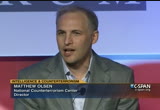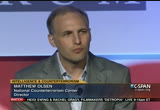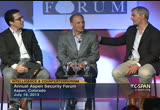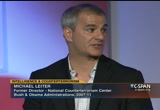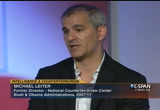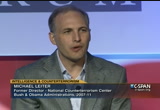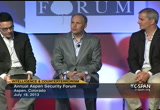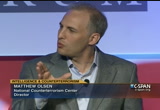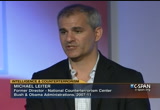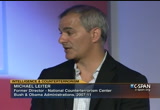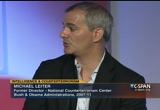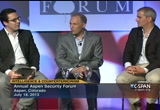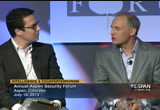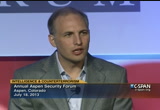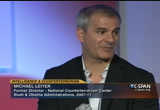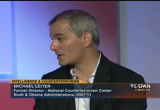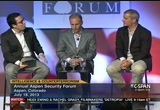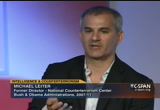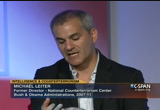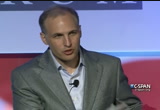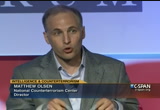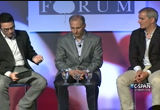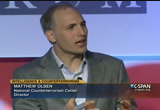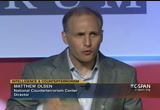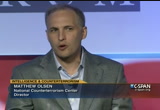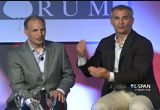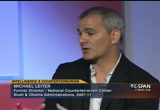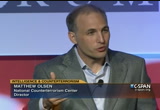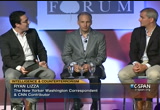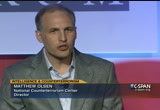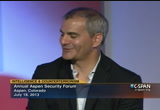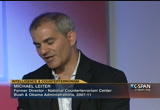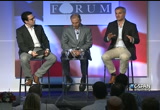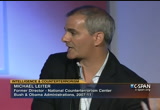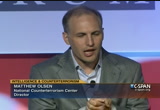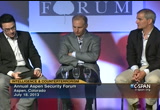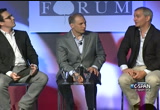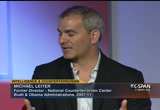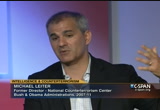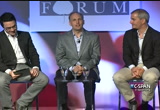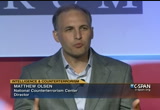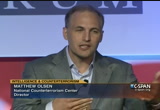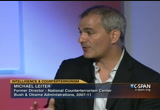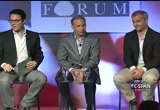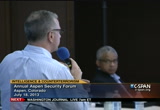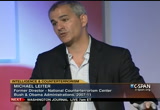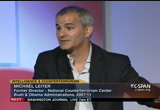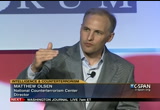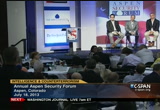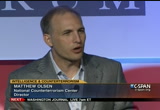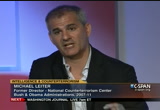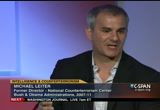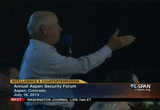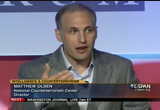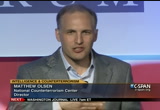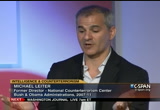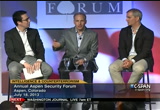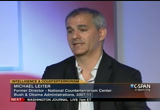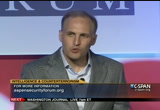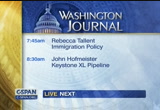tv First Ladies Influence Image CSPAN August 20, 2013 6:00am-7:01am EDT
6:00 am
they have tried three times to take out airlines over the last few years. beyond that, beyond the affiliated groups, we talked about this, the whole expense of unrest and turmoil in north africa and parts of the middle east have led to the rise of the loose network and temporary groups like benghazi to carry out -- the group that carried out the attack against our facility in benghazi last year. those types of groups deftly pose a threat was in the region. they are less a threat here at home. the final group to mention it is very quick answer is the threat from homegrown extremists. the attack on boston is the more clear example. the challenge for us as
6:01 am
individuals like the tsarnaevs is and they do not hit our radar. they do not travel and communicate in the same way learn what they need to learn the internet and become radicalized of the internet. from that perspective, it poses a real challenge. as would brief the threat, overall, i would say it remains persistent. it is increasingly complex and diverse bit -- and diverse. >> first of all, always good to be here. thank you for another great event. i want to commend matt for the great job he has done. but also, i think people should understand modern government. it is a really big deal for a current and former to sit next to each other. a lot about matt's confidence as sit next to a guy who can say anything the hell he wants. glad to keep them close. [laughter]
6:02 am
i agree with his assessment of the threat. i would add a couple of small items. we have actually done, would've talked about the threats and other places that are terrible in the world. we have to remember how successful the counterterrorism activities have been over the last 12 years. if i asked a group like this on september 12 am a 2001, and the americans will be killed in the united states i al qaeda my guess is that answer would be about 1000, 10,000. i am almost certain nobody was a 18 house and which was the -- 18,000 which is the total number of people killed by al qaeda in the u.s. in the past 12 years. we have done remarkably well. the threat is accurate.
6:03 am
we also have to look at this and understand that we are never going to see any of these threats entirely but prevent a catastrophe. will be susceptible to the smaller scale attacks we see like in boston. i would add we are always focus mostly on outlook item. -- al qaeda. people started to be, slightly more aware of the threat of extremism mostly from has below -- hezbollah. we will undoubtedly face a renewed and invigorated shiite spider terrorist threat. we have seen one of this ambassador in washington and other attacks overseas. this is something that counterterrorism immunity especially with declining
6:04 am
resources, we have to keep our eye on. >> in addition to what mike said, it will encapsulates the complexity of the challenge but to focus on syria. in syria, we have the to the assad regime. in the opposition, a growing extremist group that is seeking to become official affiliate of al qaeda. it is probably the most capable fighting force within the opposition erie it -- opposition. we have a shiite extremist group, hezbollah. then, within that, we have the existence of chemical weapons. on top of that, the biggest concern is the flow of foreign fighters to syria. it has become the dominant battlefield in the world.
6:05 am
we see foreign fighters one from western europe and in some cases to the united states to syria to fight as part of the opposition. the concern going forward is these individuals traveling to syria, become radicalized, trained, and returning as part of a global jihadist movement to western europe and potentially the united states. it really elucidates the ways the threat is complicated and again persistent. >> to ask you about president obama's may speech on terrorism. we are at a crossroads. >> we need to ask ourselves hard questions and how we should refer to them. what the best speech change and what does it mean for your mission and had to change it if at all?
6:06 am
>> it was an important speech. i am lucky to be there. i took some analysts -- no, sir. not at all. we're at a crossroads. the president in some ways, this the counterterrorism community so many in this room, it really challenged us to do two things. to think hard about the threat and to be very precise and rigorous and how we defined the threat and not fall into traps like we fell into are sought after benghazi of a binary choice. it is either al qaeda or not. that is not the reality. it is much more complicated. it needs to be careful in how we define who is al qaeda and what is the threat because of course how we defined the threat is the crux of the developing a strategy.
6:07 am
that's the second part of how the president challenged us. how to think of the threat as we look to keep up the pressure also look to a time when we are not in a state of war. that also was a way in which he challenged everybody in this room who is part of the conversation. >> how important was that speech as policy? >> i think it is a critical speech. generally, i align myself with almost everything the president said. 12 years later, it was probably the most copperheads of statement certainly by this president and arguably even going back to the time immediately after 9/11 how the u.s. government and i lies should approach terrorism -- and allies should approach terrorism. i do not mean this as a political critique but as a political counterterrorism professional critique.
6:08 am
there were some things that were not in the speech and part because his a president and you will not get into detail. the question for the national security community which is key is to name a few is there really was discussion on homegrown terrorism. this is probably the threat most relevant to most american lives. it may not be the greatest threat but the most frequent threat and we have a long way to go. with really sharp and our spirit -- our spear overseas. i was disappointed of not having any mention of mass distraction. we have done a really good job of access to biological, ready logical, or nuclear devices. -- radiological, or nuclear devices. it could be significant. we have to keep our eye on that. what is incredibly important is now it will change the way in
6:09 am
which we look at this threat, what does that actually mean for programs and budgets and government organizations? carter did a brilliant job this morning of talking about those concrete choices. we now have had the stooges playing field described by the president -- strategic playing field described by the president. with budget cuts, how are you going to allocate the finite resources in a sensible way across the counterterrorism community? the policy role have an enormous role in that process and it is not one that the u.s. government has proved particularly effective at dealing with. >> i do not disagree with anything mike has said. it was an hour-long speech. it covered a lot of ground. >> an hour and 15 minutes.
6:10 am
aboutple were thinking these questions erie it on the one question, wmd, i would reiterate. of course, the likelihood of wmd right now is low. we keep our eye on the wmd threats. we have been told about -- >> would've been told about two developments. leaking of classified data, the wiki leaks and now edwards noted. -- edward snowden. what -- from where you sit, what does he follow up from both of those development in terms of intelligence sharing and cooperation? >> let me take the second part. al qaeda had nothing to do with
6:11 am
that. they are inclined to take advantage of what is happening. it is important to say it is not one dynamic in every country. if you look at tunisia, libya, they are all different. is primary way for us that affecting our counterterrorism efforts as placing a greater degree of building relationships with emerging regimes. in libya, we are seeing a decrease in its capabilities to carry out counterterrorism efforts. we need to figure out how we are
6:12 am
going to work with emerging government. the capabilities of wanting. in yemen, we have a good relationship and improving relationship with president heidi. in each case, we need to stay engaged and work with the legitimately selected government and those countries, but that is hard. benghazi showed why that is hard. these are dangerous places and having our diplomats and our military and our intelligence officials in these locations. >> is it on the leak, is there any demonstrated reduction of intelligence sharing because people said the united states cannot be trusted with secrets anymore, everything looks out? >> it remains to be seen on snowden. especially with respect to europe and our european allies, how they may be be acting. in the city seen. -- it needs to be seen.
6:13 am
>> first of all, i would be shocked if there are not indications of intelligence al qaeda and affiliated groups have not changed the way they operate based on these leaks. we have seen in every other said -- leak situation, it makes matt's job harder. i was the president right after wiki leaks. every place i went overseas for the hour-long meeting, we easily had half-an-hour of that with me have with my head a bit off and being yelled off by our colleagues seeing how can you be so sloppy, how come you cannot control information, we will not share information with you. >> were they idle threats? >> no, they were real. it is not that if the french get to the utep -- the tip, they will not tell us. they will be much more closer with the information that release. it undermines the relationships. last but not least, the quietly
6:14 am
underserved relationship, partnership between the u.s. government is very patrick american companies -- very patriotic american companies is important going back to world war ii. i am a multinational ceo and i've been cooperating with the u.s. government and the courts tell me to do it this way and is what i was supposed to do, my market is being killed because everybody is holding up the fact that you do not want to work with x because the nsa gets everything. in accordance with the law, much more difficult to read all three of those have serious implications.
6:15 am
>> m's first point on this. we have seen response to the leaks, al qaeda affiliated groups seeking to change their tactics. looking to see what they can learn and change how they communicate to avoid detection. ofi think there's a lot mystery about what ntsd does and its role in the larger counterterrorism community. let's talk about some of the central roles that it has. one of the changes that happened on your watch, mike, was the calling of names for targeting killing moved from the national security council in the pentagon to being centralized.
6:16 am
there's been a lot of controversy about that. to the extent you could talk about, what is the role in developing and calling the targeted killing? >> it is an accurate. >> not entirely. i will narrow it a bit. fundamentally, the criticism we heard from congress and elsewhere, eric and others wrote about this. that you had in theory, the cia had a "kill list," and there was another list and it did not match up. >> and that is not entirely true either. you have the possibility that you people responsible for operations making intelligence calls about how bad someone is or not.
6:17 am
that can lead to, it can lead to perception about how we draw these analytic judgments about who is an imminent threat because they are plotting. what our role became an appropriate one is we are made up of analyst from cia, fbi it is not attached to anyone operation. that we could work with entire community and say, yes, mr. smith is in fact plotting. he is in imminent threat. -- sponsors legal authority as long service legal authority thomas -- authority, this is where we'll prioritize him to be detained or targeted or the like. that is important role. in the policy role, we work hard to develop options.
6:18 am
there a lot of people who say the u.s. government needs to be capturing the people and are killing them instead. in my experience, the idea that nobody wanted to catch anybody that we could is crazy. if you need to capture somebody, you captured them. we worked with the enter agency, the fbi, dhs to develop the options of what you could do with someone if there were captured and if they were arrested and things like that. that was a valuable role to make sure there was an interagency flavor and led to the decisions at the white house. >> we are pushing 10 years in existence next year. we are voting on the work -- building of the work that mike did them before him. we have worked to become a center of gravity of the analytics side in the planning side. taking analysis for a example, the white house now looks to us to take a look at what is the threat going to look like after 2014.
6:19 am
they also looked was to describe who is this guy and what is his role in the intelligence on him? one of the benefits we bring to doing that is everything we do in that regard is carbonated -- it's a coordinated effort. fusing information. it is also people. analysts and officers from around the community working together to produce a product
6:20 am
whether about the threat strategically or tactically that represents the view of the entire intelligence community. when that is presented to policymakers, it reflects that entire coordinated view. that is really valuable. >> another issue that has come up is the data that you do not have access to and want. last year, we changed the federal guidelines. in new guidelines allow you to basically get access to any government database. with the debate happened, you one group rejected.
6:21 am
take me through that debate. what was the thinking about changing the rules? and what government database do you have that you could not collect under the 2008 rules? why should i not be terrified about it? >> it started under mike. a couple things right of the top. we do not collect any information ourselves. we get information from other agencies that they collect whether nsa, fbi. we are not collecting it. it is the lawfully connect the -- collected. it came after 2009 that we do not have access to some of the types of information that would help us like the underwear bomber. we had great access to threat information coming from the reports provided to us by cia, the nsa. what we do not have is the kind of access we needed to
6:22 am
non-terrorism databases. information about individuals applying for refugee status in the united states or for visas. because what we need to do is have information and not just for a minute or a day or a week but long enough so we have the rate information from the cia, from a source, all we have is a name or a first name, what we do to compare the information to the other information we have also collected at the government has about people traveling care or seeking asylum so that we can then provided to the agencies that can act on it? it is my perspective that we were already doing it will be somewhat surprised i would have trouble doing. we worked very hard to work with the civil liberties and the community and dhs. >> what was the objection from dhs on the initial request for that database that worried the privacy officer?
6:23 am
>> i think it was this, i concern. i understand the concern about aggregating data. we worked closely with dhs and privacy groups to design rules that would protect the data. all the usual things you would want and expect, audit training, oversight to make sure that we were doing that sets carefully as possible. we worked with the department of justice to have new guidelines approved by the general. >> this is as a beautifully carefully leaked statement by one individual. there were many other parts of
6:24 am
dhs that absolutely wanted this to be done. matt is right. of course there are civil liberties issues. we are both lawyers. we do get these issues. you have to understand the wood saw that people can find themselves in. a few months before christmas day, i was up arguing for the extension of the patriot act, certain aspects of the patriot act. i had congressman after congressman say, why do you need to spy on americans is to mark what is going on? i had people yelling at me saying, why is my constituent watch listed? three months later, it was why aren't there more people on the watchlist? fast forward to boston, why aren't you spying on more americans? why can't you collect more data?
6:25 am
these issues are real issues. we have to stop flying the pendulum back and forth and get somewhere in the middle. the perfect example on this for dhs is, someone comes into the united states on january 1 and all you have is his name and phone number. under the old guidelines, 91 days later that information had to be flushed from nctc systems. one day 91, if you got a tip from the cia that this number was associated with al qaeda, nctc wouldn't know. imagine that hearing when the attack occurs. the issue here was, how long should nctc be able to keep this? the auditing, review, trust and verify. the old system wasn't calibrated post-9/11.
6:26 am
it wasn't calibrated post 2005. they were guidelines from 2000 and the world had changed. >> on the transparency point, we adopted these new guidelines and put them on our website. i still have a crick in my neck because last week, we had this great forum with representatives from a number of different groups on a wednesday, very concerned about our aggregation of data as well as nsa leaks. less than 24 hours later, i was in a congressional hearing where the focus was on the boston and our failure to do more given the information we have received. it was a complete 180. maybe that is right. actually i am concerned when that happens for the
6:27 am
intelligence community and intelligent professionals who need predictability. they need to be able to know where the line is in order to do our jobs. that swinging of the pendulum is problematic. >> it seems like this is an issue you will deal with a lot more going forward. the first decade of the nctc, you built up capabilities with overseas intelligence agencies, strong partnerships, but increasingly looking for data sets that the u.s. government has and also state local officials. it seems like that penetration into the domestic sphere gets people more concerned. talk to me about that and about the relationships you would like to build with state local officials.
6:28 am
>> this has come up a couple times today. some of the challenges we face in the domestic sphere. i do think that for the last several years we made real gains in how we interact and how the community as a whole interact looking overseas, making sure information is shared properly. it is much more difficult and challenging when you start looking at the picture inside the united states. we have a much more complicated structure of fbi and dhs at the federal level, and the thousands of state and local departments. and then you throw in fire departments. the challenge for us is how do we make sure our local police departments and firefighters who may be first responders, when they see something is suspicious, how do we make sure that information gets put into the national intelligence
6:29 am
picture so that we can marry up what is seen at the local level -- >> not terrorism. >> how do we make sure that is getting married up with national threats? for us at nctc that is going to be a challenge going forward working with the fbi and dhs. >> mike, to be specific, what is the kind of intelligence you wish you had when you were the director that come a going forward you would like to have? everything? >> no, i actually don't want everything.
6:30 am
you have to go through everything. it is not very important stuff. what everyone working in this field knows is you don't know what is important until after you have gotten it and compared it to other stuff and circumstances begin to evolve. how do you get a reasonable amount protected certain ways and compare it to try to figure out -- the whole connect the dots thing is so 2001. it is utterly simplistic. you don't know what dots you are looking at. you don't know what that is meaningful until you compare it to other dots. i do think we have come a long way. the fbi has evolved tremendously. task forces investigate things very well.
6:31 am
what we did simultaneously was invest lots of money in useful state and local fusion centers that get information from state and local police. they try to correlate it. the problem is that these two pieces are semi-independent, not completely independent but semi- independent. what we saw in boston is that we have to merge these two together more effectively. once you have that, you can have the fbi working with dhs instead of saying, i can't cover tsarnaev. we have closed the case, but go ahead. what nctc can bring to that is, taking that information about things that look significant and comparing that in a civil liberties protected way with lots of data that fbi and dhs don't have. you would have liked to know if this had happened, if tsarnaev had called somebody in yemen. once the fbi gets that lead, nctc can play a valuable role in looking at data to see if that is the case.
6:32 am
withoutsay all that saying one last thing. it is a problem because it requires greater domestic work. we haven't since 2001 have a great conversation in terms of domestic surveillance. even if we do all these things, we can't expect to stop all of these. these are very hard lots to stop. we are going to stop them in a variety of ways. we will stop them by not letting it will get the right fertilizer so the bomb doesn't go off. we will stop them, keep them from using good explosive devices like on christmas day. sometimes, we are going to stop bleeding by having an effective
6:33 am
response, but some things are going to get through. what we can't do is put matt up against the wall and throw darts at him. we have to make sure that matt has done his best, is going to learn from the experience. we can't simply crucify matt and counterterrorism professionals because then everybody -- >> in denver, i visited with the joint terrorism task force. then, i visited the fusion center. i asked a lot of these questions about how they would work together. we look at boston, how would that have happened? obviously, we can always do better. i think you can go back to a case that arose here in colorado, i plot to carry out attack on the subway in new york.
6:34 am
the fbi started here in the investigation in aurora, colorado. it is probably not a good idea to bring up the nsa programs because you haven't asked about it, but we can talk about this as an example of that. in terms of local police departments working with fusion centers, with fbi, it is a good example in colorado of a very effective investigation that ended up moving across the country to new york. >> we will get to the nsa in a second. let's talk about oversight, oversight of counterterrorism and intelligence agencies. mike, you recently summarized oversight of counterterrorism this way. it operates in secret. counterterror congressional
6:35 am
committees operate mostly behind closed doors. it is largely invisible to the public. as a journalist, when you put it that pointedly, none of this inspires much confidence. at the same time, these institutions couldn't operate totally transparently. the intelligence community, the story today in the paper, they seem to be losing confidence of some folks in congress. why should the public trust such a secretive oversight regime and how can we improve it? >> two things. first, i hope events like this when we see people like matthew olsen, raj de from nsa, that inspires a little bit of confidence because they are not a bunch of ogres. these are thoughtful people who are tackling very hard jobs. ashton carter, the list goes on
6:36 am
and on. second, i would like to think about it as oversight serving two purposes. one is to make sure the government is doing things right. two is to give the public confidence that the government is doing things right. in my experience, oversight on the first case looks really well. if you do something wrong, there is a congressman, inspector, protection officer, it is possible that all of them could get snowed in, sorry. you can snow them all and none will know anything is going wrong. in my experience, that is far from the case. your question, is oversight working as far as giving the public faith, that is where we have a failing. it is not an independent problem of government. look at polls and how many people trust commerce.
6:37 am
not especially high. there is a lack of faith. i think you can increase transparency but not to get too far. if you go to full transparency, you will have zero security. >> fisa -- >> they should have held hearings. it should've have been a more robust oversight board. now they will, that is good. the inspectors general can give more generic reports. congressional oversight committees, intelligence committees can talk about the subjects they are looking at without disclosing sources. john mclaughlin noted we do oversight hearings. even on the fisa court i would disagree with some of the panelists. they can release some things. they can release how many cases they get, how many are denied, how many are sent back for review. you can have periodic review by other bipartisan commissions that have credibility. you can do it incrementally but it is going to be difficult to swim against the general tide distrust of government.
6:38 am
i would also be remiss if i didn't say i could not disagree with anthony romero more that snowden did as a service. i think he did this country and incredible disservice. we are now going to have slightly more transparency and better oversight and that is a good thing. i refused to give mr. snowden credit for that. >> give snowden any credit? >> no. on the oversight piece, i think the procedures we have talked about today are a real example
6:39 am
-- it is hard to imagine and oversight regime that could exceed what has been done with fisa and 702, where there was a public debate when the law was changed. they reviewed the nsa's procedures. congress was directly involved in making those changes to fisa. a lot of folks in the room don't realize that in 2008, a fisa court review upheld the way nsa does this program. they looked at this exact mechanism of targeting non-us persons overseas and held it against the constitutional and statutory challenge. veryhasn't been reported much. that is a declassified opinion of the fisa court review. then, you have ongoing oversight of the program carries out. it is hard for me to imagine oversight regime that would
6:40 am
exceed that. >> i don't think you were using your imagination. you have to look at the fisa court. >> there is no adversarial process when a prosecutor goes and seeks to get a search warrant. you go to the judge and present the facts. it is not adversarial. i am not aware of any country that has anything like a fisa court. you could make it adversarial. you would slow down. unless you did it very carefully, you would risk disclosure. the problem is that there is just a lack of confidence and that is a problem we have maintaining these tools in government. you wrote in one of your pieces
6:41 am
that congress was somewhere below headlights and above people -- >> yes. >> that is hard for us. we depend on a relationship between communities to provide legitimacy for our programs. >> the question also is. where is the abuse? i completely understand that some people think the collection itself is the abuse. the fact is, the collection in that program has gone through our democratic process of government and the systems we set up. then, the question is if the collection is not the abuse, where has the collection of information been abused? where are the results? where people have been arrested, persecuted?
6:42 am
so far, i have not seen that. its not that we don't have to have oversight, but we can't just rush to the darkest corner of the room and assume there is abuse going on when we seem to have a total absence of such circumstances. >> you have some senators arguing that authority hasn't been exceeded. >> my argument would be, they have repeatedly extended the fisa act. i don't really like the image senators not doing anything. there are plenty of senators, congressmen who knew about this program. if they wanted to stop it, there is authorization act's. there are lots of ways to stop programs. the fact is, the majority didn't win those cases. >> let's open this conversation up to questions. we have about 15 minutes left. >> mike, i am chair of the
6:43 am
homeland security committee. i will try to limit it to one question. i believe i heard you say that with the limited information that the fbi had, what was passed to them from the russians, that some mechanism should have been designed that they should've passed on to someone else, boston police, could you expand on that? if so, i understand the complexities there, who is to do what? i have an aide in my office who says, everyone's job is no one's job. it seems like that possibility could exist there. >> i don't know declassified information so i can speak about this.
6:44 am
this is how i think you can design the system. jttf gets a tip, it could be from russians or a domestic tip saying will smith is a bad guy. fbi investigates will smith, and interviews him, turns out he is not a bad guy. closes the case. that is what happened with tsarnaev as i understand it from public reports. you could have a system where the fbi earns to the same local fusion center and says, we have this case on smith, we didn't find anything. you have different authorities at a local police office. you can knock on doors, check with friends. if you want to do that, fine. we will continue to do our search easing data from other sources.
6:45 am
this is now yours if you want to do something. in reality, most officials aren't going to do anything with that because they have other priorities. that is one way of creating a safety net below the federal investigative limits. let me just say, this is not without real civil liberties implications. i use this example with congress. this sounds great if you are dealing with someone named tsarnaev. now, let's make it bob smith in texas who is reported to be an antigovernment guy. fbi interviews him, he says no way. fbi closes the investigation, handed off to police and says, you might want to keep your eye on smith out there because he has a lot of guns. do you think a few people in congress might have a problem with that? we have to realize that we could increase the safety net we have
6:46 am
but it has implications for what state local authorities to and how that potentially infringes on civil liberties independent of official investigations. >> i completely agree. the problem is, the observation has been made that we haven't been to the crime site. our collection capabilities, the way we collect information has increased the amount of information we have. almost inevitably, when something happens like boston, we can look back and find points of opportunity to engage or do more. the lesson, the difficult lesson is the fbi bases what it can do on the amount of information it has. a predicate what they do on how much information. that is a tried and true way of conducting an investigation. how intrusive you go depends on how much information you have show that the president is violating the law. that is what we want the fbi to do. the other aspect -- the
6:47 am
opportunity within the jttf structure, the opportunity to share with representatives if it warrants, to share with their department. >> right there. >> i am adam, the fire chief in alexandria, virginia. i appreciate the conversation about state local intelligence sharing. it struck me earlier as we were having a conversation about connecting the dots that that first thing but not the only thing. there is this matter of communicating the picture to the people who need to know. that includes my people if you think of all the iconic images of these events. firefighters are front and
6:48 am
center. what do you think we still need to do to connect the dots and communicate that information effectively to the people that are zero dark thirty? >> i will answer this way. it is an nctc program that we do with fbi and dhs. it was an organization within nctc where we had a small number of state local representatives from fire departments and police departments, and serve on detail for a year or two. they can take that and turn it into, what would be useful for my department? then, we write reports. when you happen to respond -- some very helpful ways for state and local firefighters and police officers to engage at the federal level and advocate on behalf of their own departments in the community.
6:49 am
this is a program we have continued in coordination with fbi and dhs where we have people at nctc who represent our departments and police departments. >> a huge part of this is getting beyond law enforcement. for the detection, response and prevention. the fbi was doing engagement with the mosque that tsarnaev belonged to. that is great. you need lots of people other than the one carrying badges and guns to do that engagement. you have to engage the community as a real partner and not an adversary. back to your point, something nctc started right after the mumbai attack. nctc partnered with dhs, fbi and fema to do training exercises across the country about how a city should respond
6:50 am
casualty attacks. about a year before boston, nctc with fbi, dhs and fema ran exactly that scenario with 150 plus representatives from across boston, going through those scenarios. they discovered things like, we are going to have to have a process for processing the video from camera stores -- from cameras in stores. we have to think about communications via cell phone. you're not going to stop everything but what you can do is help communities prepare for these situations and really reduce casualties that you might otherwise see an accelerated investigation. >> anyone else?
6:51 am
>> while you're getting the microphone, and for the response, it is important to think about we have about 13,000 fbi agents around the country. we have 2 million first responders. that is how we are going to stop the next boston type attack. >> from george washington university, i will direct the question to matt. eight days after benghazi, you said benghazi was an act of terror. we have had a significant political and bureaucratic debate about talking points and what happened prior to that point, but what goes into the
6:52 am
formal determination that something is an act of terror? depending on the political agenda, it could be active thuggery or an act of war or an act of terror. for those who have been inside the system, eight days is not necessarily bad. >> important point after benghazi is -- i was in a hearing that was prescheduled. in the intelligence community, i think i can speak for all of the analysts that were working on this. we proceed of presumption it was a terrorist attack. you had a mortar attack that killed americans and a government facility in benghazi. they were clearly targeting our presence there. it was violence and result in
6:53 am
death. there are number of legal definitions, the practical common sense of you that we all proceeded on from the outset was this was a terrorist attack. what it does not answer is a bunch of other questions that were more complicated and how coordinated was it? when had it been planned? who was behind it? we are with those and to this day. it was unclear then as it was now. particularly coordinated. it had not been planned for very long. it does not take away from the bottom line that it was a terrorist attack. those are important questions that the debate of secured -- obscured our efforts to refocus on who was responsible for what we do about it. >> the great thing about nctc is frankly the great success stories of government reform.
6:54 am
post 9/11, i am biased, it can still do a lot of things better, but it is pretty darn good read regardless of how politically heated these discussions get, whether benghazi or fort hood, or workplace violence, i think john brennan and scott and me and matthew have really tried to keep it completely apolitical. that do not have bureaucratic fights. thealled fort hood and at terrorist a day after. with, as we see it. we are part of the intelligence community. -- we call it as we see it. i cannot tell you the politics of almost anyone at nctc. it was not an issue. people came to stop terrorist from killing americans. pretty state -- straightforward. >> we are running out of time.
6:55 am
one more question. the advantage of being in front. >> just to follow-up on one would think that matt said. you said you had seen al qaeda and affiliated groups changing their way. did you meet specific because the snowden -- did you mean specifically because of the snowden leaks. can you give us examples? >> what we are seeing is individual terrorist who are looking at this and seeking ways to circumvent our surveillance based on what they are learning. from these recent leaks, yes. we have strategic problem is our problem this we cannot keep national secrets secret.
6:56 am
not to say everything that is classified should be secret, but the things that we should be protecting are not effectively protecting, it hurts our partners and it helps our enemies. we have to fix that. we have to reinstitute the and oversight so people say it met has been working with the congress, the house, the fisa court, that is good enough. somebody is going to change the law, somebody is going to arrest matt -- sorry. i am worried what have a
6:57 am
continued run of snowdens. >> there are limits of how transparent we can be read a little bit of a trojan horse by people who do not agree by what we are doing and knowing full well how it works. taking a more strategic view for a moment, the challenge for us, everybody who works at nctc is there to protect the country. we were reagan we talk to you in this room about finding the right balance, but ultimately thomas i want to know where the line is that in a predictable way, how far can we go? my job is to protect the country. i want my folks to go to that line of legality and do everything that we can within the bounds of the law, but to go up to that line. towe move forward, would be be more transparent. i hope the oversight regime can gain the ability to allow us to do our job. >> we have to leave it there. thank you for a great discussion. [applause]
6:58 am
[captions copyright national cable satellite corp. 2013] [captioning performed by national captioning institute] >> c-span. we bring public affairs events from washington directly to you, putting you in the room at congressional hearings, white house events, briefings and conferences and offering complete gavel-to-gavel coverage of the u.s. house all as a public service of private industry. c-span, created by the cable industry 34 years ago and funded by your local cable or satellite provider. and now, you could watch us in thhd. >> this thursday, president obama embarks on a three-day bus
6:59 am
tour. stops include the university of new york at buffalo, state univ. of new york, and barack obama college in pennsylvania where he will be joined by vice president biden. this morning on c-span, "washington journal" is live. coming up in 45 minutes, the bipartisan policy center, rebecca tallent on the emigration task force report. hofmeister successes recent developments affecting the oil industry.
7:00 am
84 Views
IN COLLECTIONS
CSPAN Television Archive
Television Archive  Television Archive News Search Service
Television Archive News Search Service 
Uploaded by TV Archive on

 Live Music Archive
Live Music Archive Librivox Free Audio
Librivox Free Audio Metropolitan Museum
Metropolitan Museum Cleveland Museum of Art
Cleveland Museum of Art Internet Arcade
Internet Arcade Console Living Room
Console Living Room Books to Borrow
Books to Borrow Open Library
Open Library TV News
TV News Understanding 9/11
Understanding 9/11